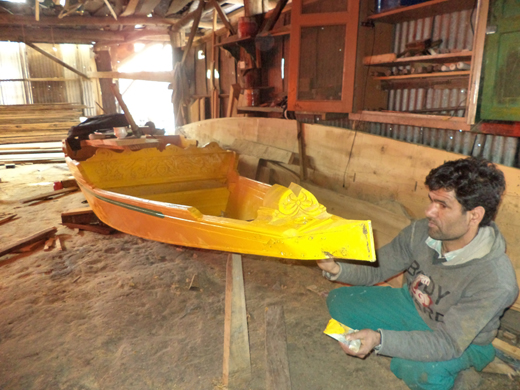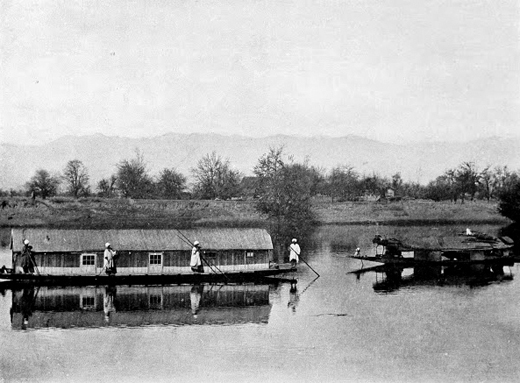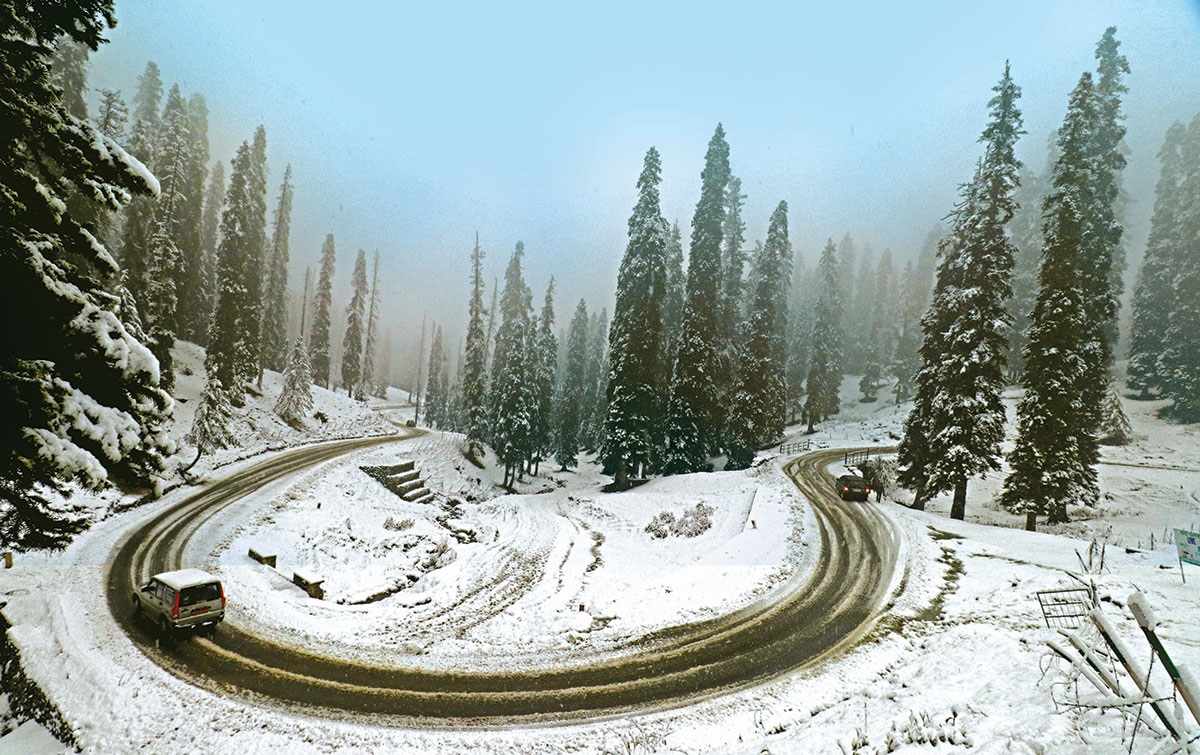With government ban in force on the making of new houseboats, a gradual decline in manual workforce associated with the craft has been noticed. If the current trend persists, it is likely that the remaining workers will be forced out of the job. Faisal Shabir Bhat brings out the plight of craftsmen associated with houseboat making
 In the interior Dal Lake locality of Abi Karapora, Ghulam Nabi Kunzoo, 43, is busy at his workshop. His family has been making shikaras and houseboats for past fifty years. His late father Haji Abdul Karim Kunzoo was a known craftsman of the area.
In the interior Dal Lake locality of Abi Karapora, Ghulam Nabi Kunzoo, 43, is busy at his workshop. His family has been making shikaras and houseboats for past fifty years. His late father Haji Abdul Karim Kunzoo was a known craftsman of the area.
According to Kunzoo a single houseboat takes more than a year to complete and involves not only huge cost but enormous skill as well. “Construction of a four bedroom houseboat may cost around 2 crore Rupees,” says Kunzoo.
Houseboats are famous worldwide for their luxurious accommodation and are a major tourist attraction of Kashmir. The beautifully crafted floating huge ‘houses’ are made from rare Cedar wood; mainly found in the forests of North Kashmir’s Lolab and Bandipora areas.
The non-availability of Cedar wood and ban imposed on the construction of new houseboats by the state government in the 1980’s pose a threat to the existence of houseboats. The ban was imposed to save water bodies from overcrowding and pollution. It continues till date.
‘’Fifteen to twenty years from now there would be no houseboats in Kashmir. The new generations will not know about houseboats,’’ says Kunzoo. He says that the art of houseboat making is vanishing fast and there are very few skilled craftsmen left in Kashmir who know the craft. He describes the continuous ban on construction of new houseboats as the main reason for most of the craftsmen to change their profession.
Presently, Kunzoo mostly makes Shikaras at his workshop. Houseboat making is very rare. “After the ban on houseboat construction most of the craftsmen were forced to change their profession, however, I continued with the trade by making Shikaras. Had there been no Shikaras I would have long changed my profession,’’ says Kunzoo.
Ghulam Hassan Bhat, 50, owns three houseboats in Dal Lake. His family has been associated with the houseboat business since 1839 when his great grandfather Salama Doono started it. Bhat says that the construction of houseboats involves a number of craftsmen who derive their livelihood from it.
The bottom base of a houseboat is made by separate craftsmen while as the upper part of the houseboat takes different kind of skill set. The nails used in the construction of houseboats are specially made of wood to prolong their life in water. These nails are known as Navi Keel (Boat Nails) and are made only in some areas of downtown Srinagar and north Kashmir. Bhat says that the ban on houseboat construction has badly affected all these people associated with it.
“We have to seek official permission even for renovating or repairing our houseboats. We cannot even plug a hole in our houseboats without government permission,’’ says Bhat. The construction work in the Dal and the Nigeen lakes is looked after by the Lakes and Waterways Development Authority (LAWDA) and the Tourism Department.
There are around 1200 houseboats in Jhelum River, Nigeen and Dal lakes. Most of the houseboats are more than 50 years old and require some retouching and repairs badly.
“One of my houseboats is almost sixty years old and needs immediate repair and if it is not repaired immediately it will be rendered useless,’’ says Bhat.
 According to Bhat the conflict in Kashmir in the 90’s drastically affected the houseboat industry with most of the foreign countries particularly the United States (U.S) and some European countries issuing travel advisories to their citizens against visiting Kashmir. “Most of the tourists who would stay in houseboats came from the U.S and Europe and the travel advisories wreaked havoc on our business,’’ he adds.
According to Bhat the conflict in Kashmir in the 90’s drastically affected the houseboat industry with most of the foreign countries particularly the United States (U.S) and some European countries issuing travel advisories to their citizens against visiting Kashmir. “Most of the tourists who would stay in houseboats came from the U.S and Europe and the travel advisories wreaked havoc on our business,’’ he adds.
Mohammad Yaseen Tuman, 41, owns two houseboats in the Nigeen Lake. His family has been into houseboat business since early 1800’s. He says that the tradition of living on a boat is very old in Kashmir. These boats on which people lived were called Darpad Dungas. The British developed interest in Kashmir after 1850’s after a famous Irish poet Thomas Moore wrote a poem Lalla Rookh about Kashmir.
Tumaan says that the British generals who visited Kashmir during the 1850’s modified the Darpad Dungas and named them houseboats. The houseboats were first developed in the river Jhelum, which flows through the heart of Srinagar city, and then they spread to the Dal and the Nigeen lakes in Srinagar.
“Long before the British came here the practice of living on boats was prevalent among Kashmiri people. The British only developed the idea of using houseboat as a long time holiday spot,’’ says Tumaan.
According to Tuman the significance of houseboat industry is that it gives livelihood to a huge number of people who are directly or indirectly associated with this trade.’’ Most of the Craftsmen who make houseboats are non Hanjis,’’ he adds. Hanjis are the house boat owners.
Tuman believes that there is a certain lobby in the government which is hell bent upon destroying the houseboat industry. He believes that the ban on construction of houseboats is totally unjustified citing pollution of water bodies; considering the fact that the sewerage of the entire Srinagar city falls into the Dal and the Nigeen Lakes.
“All the hotels located along the Boulevard road empty their drains into the Dal Lake. The Houseboats in Dal and Nigeen contribute only 3% of the total sewerage drained into the lakes daily,’’ remarks Tumaan.
Tumaan is also worried about the fact that there is a lack of skilled persons who could make houseboats. Due to the ban on construction of houseboats most of the craftsmen have changed their profession and very few are left in Kashmir, who are acquainted with the art.
He says that the death of houseboats will be catastrophe for Kashmir’s tourism industry as houseboats are a craze among foreign tourists.
The Dal and the Nigeen lakes in Srinagar have shrunk drastically over the past four decades. Experts opine that encroachments and inflow of sewage into these lakes are the main reasons for their shrinkage.
A senior official at the LAWDA says that they are following the directives of the Jammu & Kashmir High Court which has banned the construction of new houseboats. The High Court has blamed the houseboats for the pollution of the Dal and the Nigeen lakes. The court had allowed the houseboats to operate on the condition that their sewage should not directly pour into the lake.
The official says that the department has directed the houseboat owners to make proper sanitation arrangements. “They have to install a proper sanitation system for the smooth conduct of their business,’’ he added.















